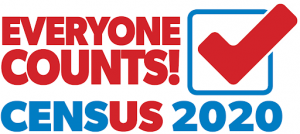
Census totals help determine the amount of funding that state governments and local communities receive from the federal government for the next decade.
Census Bureau data is used to distribute federal funds to states and local communities for health, education, housing, and infrastructure programs.
Accurate census counts ensure that funding is equitably distributed for numerous programs such as Medicaid, highway planning and construction, special education grants to states, the National School Lunch Program, and Head Start.
Because this is an important aspect of serving the community, CCLD will post a 2-part blog designed to help convey the importance of the census, keep you safe from misinformation or scams that may discourage you from being counted, and to make everyone aware of the security placed on your answers.
But First:
Can library staff help people complete the online form?
In certain ways, yes. Library staff can:
~direct respondents to the response option that best suits their needs: online, phone, mail, or a census taker visit to their home.
~point respondents to the online questionnaire guides in English and 59 other languages.
~can explain basic features of the online form, such as how to navigate the pages or change the language.
But only Census Bureau employees may collect responses directly from individuals, and only they are sworn for life to keep an individual’s responses confidential.
_____________________________________________________________________________
Now, Let’s Investigate
Part 1 – Facts and Rumors
Many questions, rumors, even fears arise when considering the U.S. Census, which is held every 10 years. Rumors as of this writing of which to be aware:
RUMOR – individuals posing as workers for the “Department of Home Affairs” are going door-to-door to confirm that everyone has a valid ID for the 2020 Census — and committing crimes at homes they are pretending to canvass.
FACT – This is a hoax.
The truth is, the Census Bureau prefers to hire employees who live in the neighborhoods they are assigned to service. And census employees are not asking the public for any identification. Furthermore, it should be noted that the United States does not have a Department of Home Affairs.
RUMOR – The 2020 Census asks about citizenship status.
FACT – The 2020 Census does not ask whether you or anyone in your home is a U.S. citizen.
RUMOR – Non-citizens are not counted in the census.
FACT – Everyone counts. The 2020 Census counts everyone living in the country, including non-citizens.
RUMOR – My answers may be shared with law enforcement or used against me.
FACT – The law prevents the Census Bureau from sharing your information with law enforcement. Your answers cannot be used to impact your eligibility for government benefits. Your answers are only used to create statistics about our country. The Census Bureau is bound by Title 13 of the U.S. Code to protect your personal information and keep it strictly confidential. That’s every answer, to every question.
Other Questions
How can I be sure my information is kept private?
By law, your census responses cannot be used by any government agency or court in any way; not by the Federal Bureau of investigation (FBI), not by the Central Intelligence Agency (CIA), not by the Department of Homeland Security (DHS) and not by the U. S. Immigration and Customs Enforcement (ICE). The law requires the Census Bureau to keep your information confidential and use your responses only to produce statistics.
Can I only take the census online?
No. The 2020 Census will be available online, by phone, and by mail. Online and phone responses can be completed in 13 languages (English, Spanish, Chinese, Vietnamese, Korean, Russian, Arabic, Tagalog, Polish, French, Haitian Creole, Portuguese, and Japanese). A paper form will be mailed to every house that hasn’t responded already when we send our fourth mail piece out.
Stay tuned for Part 2 – your security regarding your Census answers.
